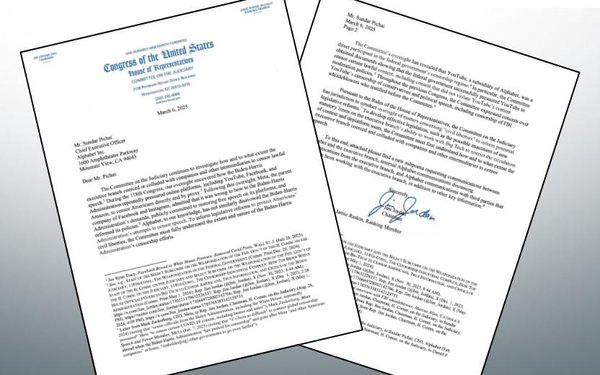
The House Judiciary Committee is demanding that
Google parent, Alphabet, provide information to Congress about alleged “censorship” by the Biden-Harris administration.
“To inform legislative reforms to protect
Americans’ civil liberties, the committee must fully understand the extent and nature of the Biden-Harris Administration’s censorship efforts,” committee chair Rep. Jim Jordan
(R-Ohio) said in a letter sent
to CEO Sundar Pichai on Thursday.
Jordan added that his committee has “obtained documents showing that the federal government successfully pressured YouTube to censor certain lawful
content, including content that did not violate YouTube’s content moderation policies.”
advertisement
advertisement
The lawmaker sent Alphabet a subpoena for a trove of data -- including information regarding
communications between the company and officials in the executive branch of government, and internal Alphabet conversations regarding communications from the government.
“To develop
effective legislation, such as the possible enactment of new statutory limits on the executive branch’s ability to work with Big Tech to restrict the circulation of content and deplatform users,
the committee must first understand how and to what extent the executive branch coerced and colluded with companies and other intermediaries to censor speech,” the House member wrote.
Jordan referred in the letter to Meta Platforms' recent decision to replace fact-checkers with “community
notes” and eliminating restrictions on some topics, and CEO Mark Zuckerberg's statement that the Biden administration “pressured” the company to suppress some COVID-19 related
speech.
“Meta, the parent company of Facebook and Instagram, admitted that it was wrong to bow to the Biden-Harris Administration’s demands, publicly committed to restoring free
speech on its platforms, and reformed its policies,” Jordan wrote. “Alphabet, to our knowledge, has not similarly disavowed the Biden-Harris Administration.”
Google
spokesperson José Castañeda says the company will “continue to show the committee how we enforce our policies independently, rooted in our commitment to free expression.
Jordan has repeatedly accused tech companies,
Democrats and others of collaborating to suppress conservative voices online.
Last year, his committee said in a staff report that the ad industry's now-defunct Global Alliance for Responsible Media, a brand safety initiative
established by the World Federation of Advertisers, likely violated U.S. antitrust laws by orchestrating an initiative to avoid placing ads in media outlets carrying "disfavored" content.
A
World Federation of Advertisers spokesperson said last year that allegations that GARM engaged in anti-competitive behavior are baseless.
“GARM creates voluntary industry standards on
brand safety and suitability which media sellers and ad tech companies can voluntarily adopt, adapt or reject,”the spokesperson said. “This in turn allows advertisers to make choices
similar to the way they buy advertising in TV, print or radio.”
Jordan's committee also issued a 2023 staff report accusing the Federal Trade Commission of “harassing” X (formerly Twitter) due to
Musk's decision to reinstate accounts of prominent conservatives. That report noted that the FTC had repeatedly questioned Twitter in the three months immediately following Musk's purchase of the
platform.
Former FTC Chair Lina Khan responded that the agency questioned X as part of an investigation into its compliance with privacy and security conditions set out in a consent decree.
She added that X owner Elon Musk had directed employees to take action that would have violated the decree, but “longtime information security employees” at the company intervened and
instituted privacy safeguards.
Jordan isn't the only Republican to claim social media companies suppressed speech due to government pressure.
For instance, attorneys general in
Louisiana and Missouri sued the Biden administration for supposedly coercing social media companies to remove posts about topics such as COVID-19 and vaccines.
A district court judge issued an
injunction that could have prevented Biden administration officials from discussing controversial subjects with personnel at social media platforms, but the Supreme Court struck down the order in a
6-3 ruling authored by Justice Amy Coney Barrett.
She said the plaintiffs lacked “standing” to proceed because they hadn't shown a “substantial risk” that their First
Amendment rights would be violated in the near future, and also noted that social media platforms have long moderated content.
“The platforms, acting independently, had strengthened
their pre-existing content moderation policies before the government defendants got involved,” she wrote, adding that Facebook revised its COVID-19 policies in February 2021 -- before White
House officials began speaking to the company about the pandemic.